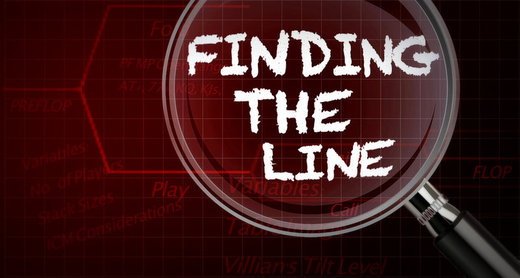






A Street By Street Strategic Look At A Poker HandWe Give You The Options, You Pick The Line |
|
|

Playing a hand well requires multiple streets of good decisions, which pros refer to as a line. In Card Player’s new Finding The Line series, readers will be able to let us know what they consider to be the most optimal lines in hands played by professionals at some of the largest tournaments in the world.
Card Player will give the options of a player on each street and the readers can put together what they consider to be the most optimal line and leave it in the comments section below.
The Situation
You are at the final table of a very small, elite, nose bleed stakes poker tournament. You are eight-handed, but only five people are paid due to the small number of entrants. The blinds are 4,000-8,000 with a 1,000 ante.
You have just over 24 big blinds with 196,000 in chips.
Pre-Flop
You are in the hijack with K K
K and action folds to you. The players behind you are all solid, aggressive players. Do you:
and action folds to you. The players behind you are all solid, aggressive players. Do you:
A.) Limp – You disguise the strength of your hand by not raising and maybe a player behind you will raise.
B.) Min-raise – You are immediately getting value from your hand by raising and can maybe get played back at by somebody who thinks you are raising light from the cutoff.
C.) Raise larger (3-4 times the blind) – You are trying to get more value from your hand by raising bigger. You cut down the big blind’s immediate pot odds by raising larger.
D.) Fold – One of your opponents behind you fails to protect his hand while he is checking his cards. You see that his has pocket aces.
Reality
Action folded to Tim Adams in the $100,000 buy-in World Poker Tour Alpha 8 event in St. Kitts. He min-raises to 16,000 and gets a call from Jason Koon in the big blind.
The Flop
The flop is 8 3
3 2
2 and your opponent checks. Pot size is 52,000. Do you:
and your opponent checks. Pot size is 52,000. Do you:
A.) Check – You make your hand look like it missed that flop and can maybe pick up value from a turn bluff that thinks you have an ace-high type of hand. You may also be able to induce a double barrel bluff by checking the flop.
B.) Bet small (around half the size of the pot or less) – You continue to get value from your hand by betting and keep your opponent’s range wide by not trying to blow him out of the water on the flop. You can also possibly induce a check-raise from a worse hand by betting on the smaller side.
C.) Bet larger (70-100 percent of the pot)- The board is very draw-heavy. With two hearts and a possible straight draw, you want to charge your opponent the max to draw out on you. Especially with the money bubble approaching.
Reality
After Koon checked, Adams bet 20,000. Koon check-called and they saw a turn card.
The Turn
The turn is the A . Your opponent checks. Pot size is 92,000. Do you:
. Your opponent checks. Pot size is 92,000. Do you:
A.) Check – You don’t want get blown off your hand by getting check-raised by both better and worse hands. You have the nut flush draw and would like to be able to see the river for cheap.
B.) Bet small – You want to continue to get value from hands like smaller pairs and possibly smaller flush draws, but don’t want to discourage them from calling.
C.) Bet larger – You have the nut flush draw. You have some equity against anything your opponent has and you want to commit yourself here.
Reality
Koon checks and Adams checks behind.
The River
The river is the K and your opponent leads out for 33,000. The pot, including Koon’s river bet, is 125,000. You have 160,000 remaining in your stack. Do you:
and your opponent leads out for 33,000. The pot, including Koon’s river bet, is 125,000. You have 160,000 remaining in your stack. Do you:
A.) Fold – You think the only hand he bets on the river here are flushes and straights.
B.) Call – You think your hand is best here a good percentage of the time, but the hands that you think probably wouldn’t call a raise.
C.) Raise – You think he can call a raise with a worse hand like a set or two pair and you want to get value in that situation. You are effectively committing yourself to calling a jam from your opponent given that you have 159,000 left in your stack before the river is dealt.
Reality
Koon bet 33,000 and Adams quickly called. Koon showed A-3 and Adams scooped the pot with a set of kings. Koon dropped to 373,000 in chips while Adams climbed to 265,000.
Adams was eventually the bubble boy, finishing in sixth place, while Koon rebounded from the hand to finish fourth for $298,760.
Adams took a line of B-B-A-B. Let us know what line you would take and why in the comments below for a chance at winning a Card Player digital subscription. We’ll post the results of the most popular line in the next edition of Finding The Line.
